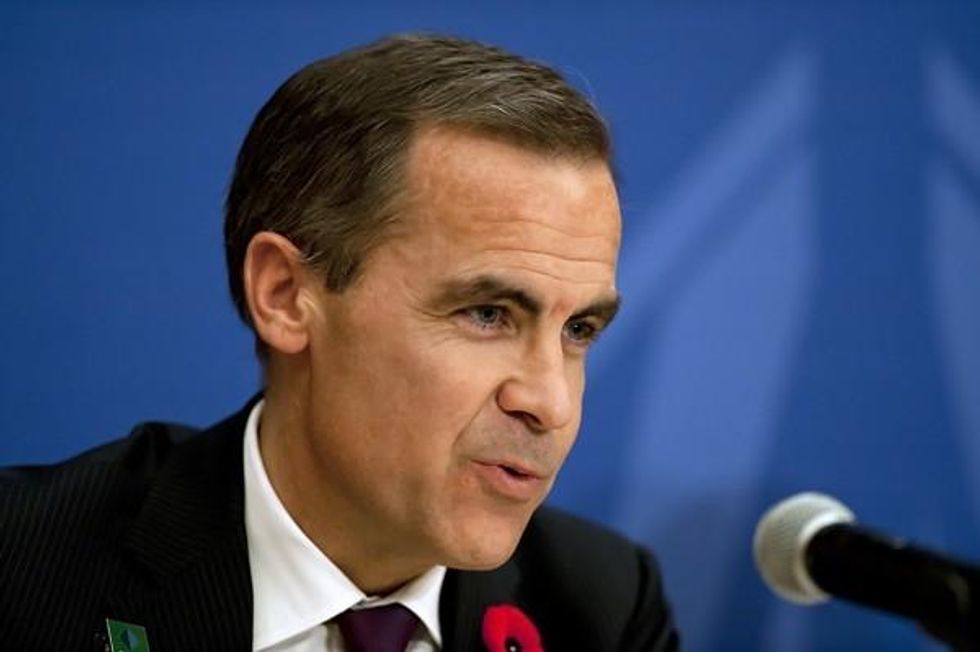Another Goldman Sachs Creature Given Vital Government Post
Big news yesterday in the United Kingdom, where the citizenry surveyed its domestic banking system and discovered that it couldn't find a single person trustworthy enough to put in the top job at the Bank of England. So they went to Canada and stole that country's central banker, Mark Carney, who just happens to be a former Goldman, Sachs executive - he was once Goldman's managing director of investment banking.

Carney's appointment may be seen as an admission that the British banking sector is now so tainted, only an outsider can be trusted to govern them. Almost all of the major English banks have been dinged by ugly scandals. The LIBOR mess, in which banks have been caught messing around with global interest rates for a variety of sordid reasons, has most infamously implicated Barclays, but the Royal Bank of Scotland is also a cooperator in those investigations.
Meanwhile, HSBC has been accused of laundering billions of dollars of Mexican drug money, a monstrous mess that recalls the infamous Bank of New York scandal of the late Nineties involving Russian mob money; officials have described the HSBC culture as "pervasively polluted." And the British bank Standard Chartered is now being forced to pay $330 million to settle claims that it laundered hundreds of billions of dollars on behalf of Iran.
But Mark Carney is no Elliott Ness, brought in from the outside to clean the streets of Chicago. Instead, he's another Geithner-esque character who will almost certainly prefer a hands-off regulatory approach, and seems to view the power of the government and the central bank as being necessary mainly to help bolster public confidence in the banking system. He'll likely be another central banker in the mold of Ben Bernanke, who's used endless rivers of cheap loans and money-printing programs like Quantitative Easing to keep floating corrupt banks all night long, for as long as they want to keep playing the roulette table. Here's the Guardian's prediction with regard to Carney:
He and many others in central bank circles know that most of the Britain's banks are very highly leveraged. That without the support of the Bank of England's quantitative easing programme, and its very low lending rates - all effectively backed by British taxpayers - Britain's banks would effectively be insolvent.
And so Carney will continue with quantitative easing - which has provided British banks with the liquidity needed to indulge in speculative activity both at home and abroad, speculative activity that bears a scary resemblance to that undertaken before the crisis.
What the banking system really needs is a guy who will step in and force bankers to go back to being boring, risk-averse drips who lend businesses money to buy new equipment or fleets of trucks or whatever. What we have instead are coked-up wannabe big shots straight out of Boiler Room who are washing Mexican drug money and laundering Middle Eastern cash and playing around with wild price-fixing schemes - pretty much everything you can think of that isn't quietly counting beans and helping grow the economy.
The British have a tough job ahead trying to clean that mess up, but appointing another Goldman vet to a crucial government job - the latest in a long line of such appointments, stretching from Bob Rubin to Hank Paulson to Neel Kashkari to former Ex-Im Bank chief Kenneth Brody, former Bush chief of staff Josh Bolten, and former Fannie Mae president James Johnson - doesn't sound like a good star
An Urgent Message From Our Co-Founder
Dear Common Dreams reader, The U.S. is on a fast track to authoritarianism like nothing I've ever seen. Meanwhile, corporate news outlets are utterly capitulating to Trump, twisting their coverage to avoid drawing his ire while lining up to stuff cash in his pockets. That's why I believe that Common Dreams is doing the best and most consequential reporting that we've ever done. Our small but mighty team is a progressive reporting powerhouse, covering the news every day that the corporate media never will. Our mission has always been simple: To inform. To inspire. And to ignite change for the common good. Now here's the key piece that I want all our readers to understand: None of this would be possible without your financial support. That's not just some fundraising cliche. It's the absolute and literal truth. We don't accept corporate advertising and never will. We don't have a paywall because we don't think people should be blocked from critical news based on their ability to pay. Everything we do is funded by the donations of readers like you. Will you donate now to help power the nonprofit, independent reporting of Common Dreams? Thank you for being a vital member of our community. Together, we can keep independent journalism alive when it’s needed most. - Craig Brown, Co-founder |
Big news yesterday in the United Kingdom, where the citizenry surveyed its domestic banking system and discovered that it couldn't find a single person trustworthy enough to put in the top job at the Bank of England. So they went to Canada and stole that country's central banker, Mark Carney, who just happens to be a former Goldman, Sachs executive - he was once Goldman's managing director of investment banking.

Carney's appointment may be seen as an admission that the British banking sector is now so tainted, only an outsider can be trusted to govern them. Almost all of the major English banks have been dinged by ugly scandals. The LIBOR mess, in which banks have been caught messing around with global interest rates for a variety of sordid reasons, has most infamously implicated Barclays, but the Royal Bank of Scotland is also a cooperator in those investigations.
Meanwhile, HSBC has been accused of laundering billions of dollars of Mexican drug money, a monstrous mess that recalls the infamous Bank of New York scandal of the late Nineties involving Russian mob money; officials have described the HSBC culture as "pervasively polluted." And the British bank Standard Chartered is now being forced to pay $330 million to settle claims that it laundered hundreds of billions of dollars on behalf of Iran.
But Mark Carney is no Elliott Ness, brought in from the outside to clean the streets of Chicago. Instead, he's another Geithner-esque character who will almost certainly prefer a hands-off regulatory approach, and seems to view the power of the government and the central bank as being necessary mainly to help bolster public confidence in the banking system. He'll likely be another central banker in the mold of Ben Bernanke, who's used endless rivers of cheap loans and money-printing programs like Quantitative Easing to keep floating corrupt banks all night long, for as long as they want to keep playing the roulette table. Here's the Guardian's prediction with regard to Carney:
He and many others in central bank circles know that most of the Britain's banks are very highly leveraged. That without the support of the Bank of England's quantitative easing programme, and its very low lending rates - all effectively backed by British taxpayers - Britain's banks would effectively be insolvent.
And so Carney will continue with quantitative easing - which has provided British banks with the liquidity needed to indulge in speculative activity both at home and abroad, speculative activity that bears a scary resemblance to that undertaken before the crisis.
What the banking system really needs is a guy who will step in and force bankers to go back to being boring, risk-averse drips who lend businesses money to buy new equipment or fleets of trucks or whatever. What we have instead are coked-up wannabe big shots straight out of Boiler Room who are washing Mexican drug money and laundering Middle Eastern cash and playing around with wild price-fixing schemes - pretty much everything you can think of that isn't quietly counting beans and helping grow the economy.
The British have a tough job ahead trying to clean that mess up, but appointing another Goldman vet to a crucial government job - the latest in a long line of such appointments, stretching from Bob Rubin to Hank Paulson to Neel Kashkari to former Ex-Im Bank chief Kenneth Brody, former Bush chief of staff Josh Bolten, and former Fannie Mae president James Johnson - doesn't sound like a good star
Big news yesterday in the United Kingdom, where the citizenry surveyed its domestic banking system and discovered that it couldn't find a single person trustworthy enough to put in the top job at the Bank of England. So they went to Canada and stole that country's central banker, Mark Carney, who just happens to be a former Goldman, Sachs executive - he was once Goldman's managing director of investment banking.

Carney's appointment may be seen as an admission that the British banking sector is now so tainted, only an outsider can be trusted to govern them. Almost all of the major English banks have been dinged by ugly scandals. The LIBOR mess, in which banks have been caught messing around with global interest rates for a variety of sordid reasons, has most infamously implicated Barclays, but the Royal Bank of Scotland is also a cooperator in those investigations.
Meanwhile, HSBC has been accused of laundering billions of dollars of Mexican drug money, a monstrous mess that recalls the infamous Bank of New York scandal of the late Nineties involving Russian mob money; officials have described the HSBC culture as "pervasively polluted." And the British bank Standard Chartered is now being forced to pay $330 million to settle claims that it laundered hundreds of billions of dollars on behalf of Iran.
But Mark Carney is no Elliott Ness, brought in from the outside to clean the streets of Chicago. Instead, he's another Geithner-esque character who will almost certainly prefer a hands-off regulatory approach, and seems to view the power of the government and the central bank as being necessary mainly to help bolster public confidence in the banking system. He'll likely be another central banker in the mold of Ben Bernanke, who's used endless rivers of cheap loans and money-printing programs like Quantitative Easing to keep floating corrupt banks all night long, for as long as they want to keep playing the roulette table. Here's the Guardian's prediction with regard to Carney:
He and many others in central bank circles know that most of the Britain's banks are very highly leveraged. That without the support of the Bank of England's quantitative easing programme, and its very low lending rates - all effectively backed by British taxpayers - Britain's banks would effectively be insolvent.
And so Carney will continue with quantitative easing - which has provided British banks with the liquidity needed to indulge in speculative activity both at home and abroad, speculative activity that bears a scary resemblance to that undertaken before the crisis.
What the banking system really needs is a guy who will step in and force bankers to go back to being boring, risk-averse drips who lend businesses money to buy new equipment or fleets of trucks or whatever. What we have instead are coked-up wannabe big shots straight out of Boiler Room who are washing Mexican drug money and laundering Middle Eastern cash and playing around with wild price-fixing schemes - pretty much everything you can think of that isn't quietly counting beans and helping grow the economy.
The British have a tough job ahead trying to clean that mess up, but appointing another Goldman vet to a crucial government job - the latest in a long line of such appointments, stretching from Bob Rubin to Hank Paulson to Neel Kashkari to former Ex-Im Bank chief Kenneth Brody, former Bush chief of staff Josh Bolten, and former Fannie Mae president James Johnson - doesn't sound like a good star

